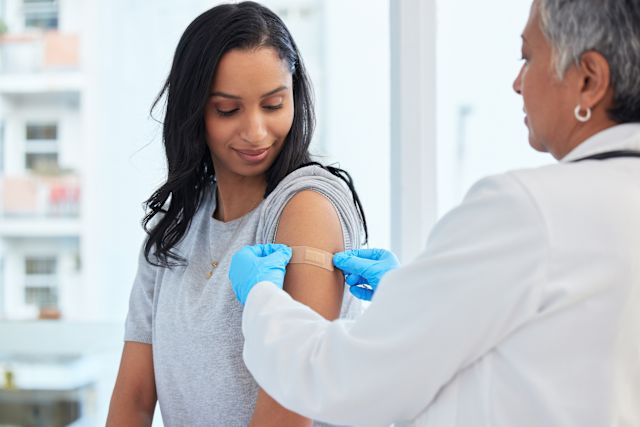Updated on May 12, 2025.
With the spotlight often on childhood vaccines, it’s a common misconception that adults are fully protected.
But there are several vaccines that most people need at specific times throughout adulthood, says Richard Levine, MD, a family medicine physician in Cherry Hill, New Jersey. Learn when you need these shots—and why they’re so important.
Flu vaccine
When to get it: Once a year, between September and January (but it’s okay to get it later if you miss that window). The Centers for Disease Control and Prevention (CDC) says the best time to get it is by the end of October.
Why it matters: “Even if you’re young and healthy, the flu can knock you down for around three to five days,” says Dr. Levine. “It feels terrible, and it can take important time away from work, school, and caring for your family. And you really don’t want to spread it to other people, especially older adults or little children.”
The flu is a serious illness. Thousands of people die from it each year. Even if you assume you’d bounce back from it quickly, protecting yourself protects your community. This one act could save the lives of people you love.
Expert tip: Don’t believe the hype—you cannot get the flu from the flu vaccine. There’s no live virus in the shot.
Healthy people between the ages of 2 and 49 could choose to receive the nasal spray flu vaccine. It contains weakened viruses. But you still can’t get the flu from the nasal spray flu vaccine. This is because the weakened viruses are cold-adapted, which means they can only multiply at cooler temperatures—not the lungs or other warmer areas of the body. Keep in mind, people who are pregnant or have certain medical conditions are not eligible to get the nasal spray flu vaccine.
“People do sometimes feel sick shortly afterwards, but it’s not because you have the flu,” Levine explains. "It can rev up your immune system a little so that you feel under the weather. But it's an immune response, not an infection, and it usually lasts no more than a day."
Tetanus, diphtheria, and pertussis (Tdap) vaccine
When to get it: You should have had your first Tdap around age 11 or 12. If you didn’t, tell your healthcare provider (HCP) so you can receive it right away. Then, get a tetanus and diphtheria (Td) booster every 10 years after your initial Tdap.
If you’re pregnant, you should get vaccinated, usually during the third trimester. Other parents and close adult relatives, including grandparents, should be up to date, too. Get the Tdap two weeks before seeing the baby if you haven’t had the shot before. “Babies don’t get immunized against pertussis until 6 months of age, so this offers protection,” Levine says.
If you have a deep cut or puncture wound, or a cut that gets dirt in it, get a tetanus booster if:
- You were never vaccinated
- You’re unsure of your vaccination history
- You did not get all your shots as a child
- It’s been 5 or more years since your last tetanus shot
Why it matters: Tetanus and diphtheria are rare in the United States today thanks to vaccination. That means most of us have never seen their alarming effects. But they cause severe symptoms and can lead to death.
“Tetanus paralyzes the jaw and neck muscles, so that you can’t swallow or breathe,” says Levine. “It's not very common, but it's very deadly, so vaccination is key.” Diphtheria makes it difficult to breathe and swallow as well, and can lead to heart failure, paralysis, and death. “With pertussis, you’re going to have a terrible cough that can last for weeks, but you’ll most likely recover,” he says. “However, it could be catastrophic if you spread it to babies or older adults, who might not be fully immunized. It still kills people.”
Expert tip: Medicare part D (drug coverage) will typically cover the Td booster. Ask your HCP or a Medicare representative if you’d like more information.
Chickenpox vaccine
When to get it: Typically, the first dose is given between 1 and 2 years of age and the second dose is given between 4 and 6 years of age. If you never received it—the vaccine was only introduced in 1995—and you’ve never had the chickenpox, you should receive two doses, at least 28 days apart.
Why it matters: You might associate the chickenpox with itchy red bumps and staying home from school. But this virus can cause more damage than you might think, including:
- Possible infections or lifelong scars
- Dehydration
- Bleeding issues
- Blood infections/sepsis
- Serious complications like brain damage, pneumonia, and, in rare cases, death
Expert tip: “The older you are when you get chickenpox, the worse it’s likely to be, so if you’re not immune as an adult, get vaccinated,” warns Levine.
Shingles vaccine
When to get it: Two shots at age 50, between 2 and 6 months apart. The CDC specifically recommends the shingles vaccine Shingrix. People should get it even if they’ve had shingles before or received the previous version of the vaccine. People who are 19 years or older can also get the vaccine if they have a weakened immune system.
Why it matters: Shingles and chickenpox are caused by the same virus, called Varicella zoster. If you were exposed to it as a child, it can reactivate years later in the form of shingles.
Shingles causes an extremely painful rash that typically appears in a band-like formation on one side of your body. It’s associated with fevers, body aches, and chills. It can also lead to complications like post-herpetic neuralgia, or nerve pain that lingers in the area long after the rash has cleared.
Expert tip: Get the singles vaccination whether you’ve had chickenpox or not. The vast majority of Americans over age 40 test positive for varicella zoster, even if they don’t remember ever having had chickenpox. If you’ve already had shingles, you should get vaccinated, too. Doing so lowers your risk of experiencing another outbreak.
Pneumonia vaccine
When to get it: The following people should get this shot:
- People ages 50 and older
- Children younger than 5
- People who smoke, drink alcohol, or take illicit drugs
- People with health issues, such as asthma, diabetes, HIV, or heart disease
- People with a weakened immune system
Why it matters: The pneumococcal vaccine protects people from a bacteria called pneumococcus. Pneumonia is a serious lung infection, claiming the lives of over 40,000 people each year. It causes fevers, body aches, headaches, and makes it difficult to breathe. It can lead to dangerous complications like bloodstream infections or meningitis, an infection of the brain and spinal cord.
Expert tip: Some people are at higher risk, but anyone can get pneumococcal disease.
Measles, mumps, and rubella vaccine (MMR)
When to get it: Children should get one dose between 12 and 15 months and another between ages 4 and 6 years. If not, at least one dose should be taken as an adult if you were born later than 1956 (unless you know you’ve had all three of the diseases it covers).
Why it matters: Measles, mumps, and rubella are all serious illnesses that spread easily through the air. Measles can lead to seizures and brain damage. Complications of mumps include deafness and meningitis. Rubella, or German measles, can cause birth defects or miscarriage, so it’s especially important for people of childbearing age to make sure they’re covered.
Expert tip: The MMR vaccine does not cause autism and it doesn’t contain mercury.
Human papillomavirus (HPV) vaccine
When to get it: The ideal time to receive the HPV vaccine is between ages 9 and 12. The younger you complete this vaccine series, the more effective it’s likely to be. If you miss that window, it’s approved for everyone until age 26, though receiving it at older ages may not be as effective for reducing the risk of cancer. In certain circumstances, an HCP may recommend being vaccinated up until age 45.
Why it matters: HPV is the most common sexually transmitted disease in the U.S. It causes genital warts, against which the vaccine protects. “This is also the first vaccine that actually helps prevent cancer, which is amazing,” says Levine. “HPV can cause cancer of the cervix, vagina, vulva, penis, rectum, and the oropharynx, an area that includes the back of the throat, base of the tongue, and tonsils.”
Expert tip: Get vaccinated even if you already have HPV. Why? There are at least 150 different strains of the virus. The vaccine protects against strains you may not have.
Some people need extra protection
COVID-19 vaccines can reduce the risk of serious illness and death from the infection. The CDC advises that all adults and children older than 6 months should stay up to date on the latest vaccines for their age group.
Furthermore, you might need additional vaccines if you’re:
- Traveling to another country
- Pregnant
- Working in healthcare or childcare
When it comes to vaccines, there are exceptions to every recommendation. Some people shouldn’t get certain vaccines due to allergies or their medical history. Always check with your HCP before receiving a new shot.







